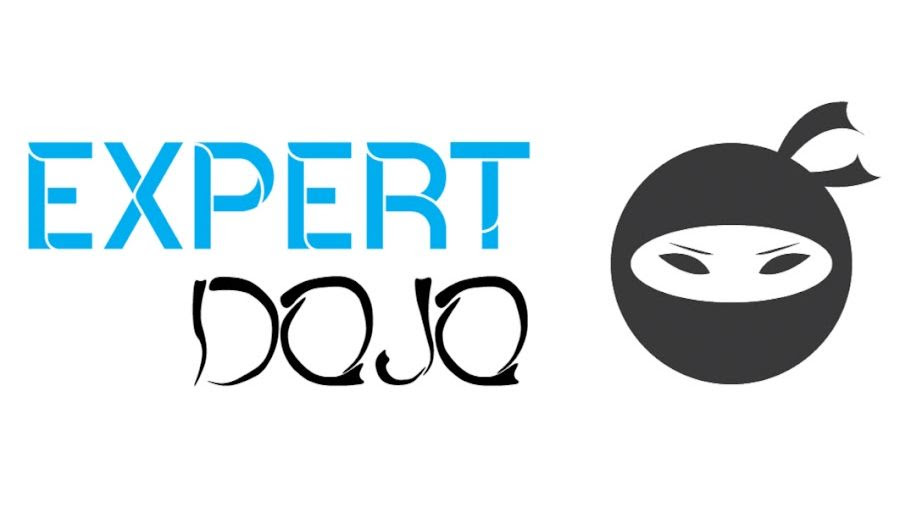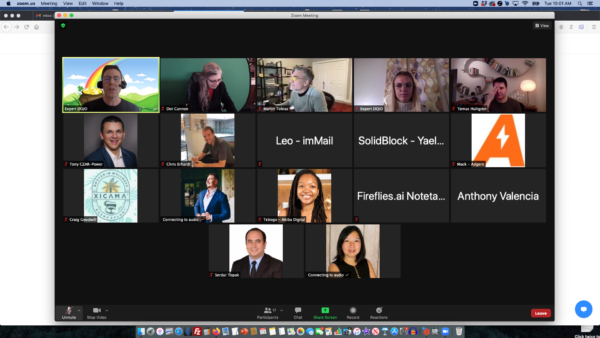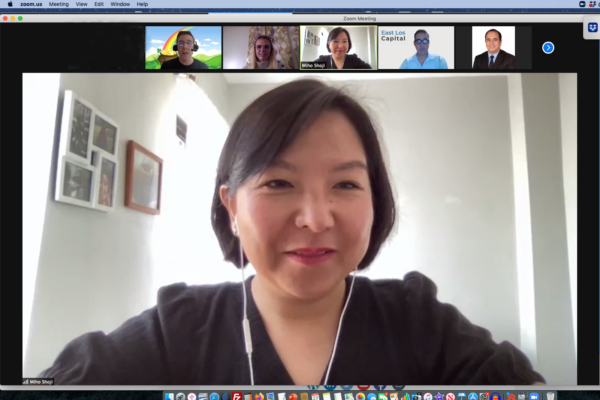by Dot Cannon

(Logo courtesy of Expert Dojo, and used with permission.)
What are some of the current problems facing global society? And how can innovators from all over the world solve them?
On Tuesday morning, that’s exactly what Santa Monica-based Expert Dojo explored.

Their virtual “Cohort Spring 21 Demo Day” showcased 13 startups, who represented countries including Africa, Israel and Canada, as well as the U.S.. These presenters had enrolled in Expert Dojo’s most recent eight-week program.
Each participant had five minutes to pitch their product or service to potential investors. And over the next ninety minutes, attendees would hear from startup founders in ten different industries, including music technology, AI and marketing tech.
You’ll recall, we first met Expert Dojo Founder/CEO Brian Mac Mahon during the 2015 Los Angeles Green Festival Expo. Since then, Expert Dojo has grown to Southern California’s most active international early-stage startup accelerator. They’ve invested in over 100 startups since 2018, according to their website. Meanwhile, they’re trailblazers in their own right. Forty-one percent of these startups have been either founded or led by female entrepreneurs.
Boosting employee engagement through AI
Tuesday’s pitches started off with a look at a modern workplace problem.
“Relationships between managers and employees are very tense,” explained Moodbit Co-founder and CEO Miho Shoji. (“And this was the case, even before the pandemic.”)
Miho said employee disengagement costs U.S. companies 600 billion dollars annually. However, the problem is a global one.
Moodbit, she continued, uses artificial intelligence to measure employee engagement. As opposed to yearly satisfaction surveys, Moodbit gathers data anonymously, giving managers insights in real time. Then, it provides action plans, to improve employee well-being and increase productivity.
“Join me in the future of work,” Miho concluded.
Of course, one article can’t do justice to the creativity and passion behind all the startups Expert Dojo featured during Tuesday’s Demo Day. But here are several more of our personal favorites!
The music and the…listener
“I just want you to listen to the song. Nothing else,” said Tunedly CEO and Co-Founder Chris Erhardt.
Then, he played a rock-flavored country vocal.
“I have just one question…did you like the song?” Chris asked, after the music ended.
Several participants gave a Zoom thumbs-up.
“You liked the song (without knowing who the artist is)…You made your decision purely based on the music,” Chris said.
“But that’s not how we normally make decisions based on music. We go to YouTube, watch Spotify. We make our decisions based on everything around the music.”
Tunedly, he continues, is the first music-discovery platform based on the music alone. How this works: independent artists upload their music. Then, Tunedly will “strip everything away”.
“No artist name, no music video, no images, social media, nothing,” Chris said.
Audience members then listen, and vote for their top favorite selections. Songs get tracked privately, and Tunedly presents a monthly “Top Ten”, based on audience input.
Those selections, Chris said, get signed to publishing deals by Tunedly.
Chris, who is a former songwriter and music producer, explained that Tunedly also has an interactive online recording studio. Their online roster of professional musicians, available for studio work, includes guitarists, pianists and engineers.
“We love the fact of the studio in your pocket, and we see that as a massively awesome feature,” Brian commented.
An evolving economy

In the course of “Demo Day”, Expert Dojo spotlighted two African startups. Each was focused on solving the problem of disconnect between middle-class Africans and purchasing power.
When wi-fi connection problems prevented the Klasha team from pitching from their location in Nigeria, Brian presented their information.
“The problem over in Africa is, the amount of countries there are,” Brian said. “(There are) 50 or 60 difference currencies. Which means the likes of the Paypals are not physically able to function over there.”
Consequently, he continued, brands are losing out on up to 70 percent of the sales they could otherwise make.
But, he continued, startup Klasha is solving that problem–by integrating with brands with a seamless major payment gateway. Brian said Africa has “a huge growing middle class”, and one of the fastest-growing populations.
Later that morning, Akiba Digital Co-founder CEO/CTO Tebogo Mokwena offered a look at another aspect of Africa’s economy, during her pitch.
“The problem that we’re trying to (solve) is the injustice that exists, currently, in Africa, where 80 percent of Africans can’t access financial products, due to traditional credit scoring,” she said.
This scoring, Tebogo continued, was based on a “partial view, based on your history of credit”.
Consequently, she explained, Akiba has built an AI-based platform which leverages alternative information.
By collecting live data sets through strong machine learning, the platform predicts customers’ future credit health!
“(Over the next few years, we can) touch over 100 million lives,” Tebogo said.
Words, emotions, empathy
“When was the last time you guys wrote a love letter?” asked Instoried Founder and CEO Sharmin Ali.
“Well, I wrote one at the age of 21. And I can tell you, I was really, really bad…at expressing my feelings.”
That problem, Sharmin continued, is also familiar to marketing content creators. How to evoke the desired reactions, since consumer decisions are emotion-based?
Consequently, her startup, as she said, “uses technology to add life into a rock.”
Instoried’s AI, Sharmin said, gauges content performance even before users publish that content.
“We are able to create content that is so much more human and…filled with empathy, that you would never, ever lose a customer again.”
Instoried’s data-driven and sharable approach, Sharmin explained, is designed to keep consumers coming back to a brand’s platform. On their website, Instoried offers features which include word and phrase recommendations, analysis of copy’s tone and emotions and a pre-publishing panel review.
While Instoried started as a business-to-business service, Sharmin added, they’re also about to add a business-to consumer platform.
“There are so many people that are interested in this, before (it even arrived in the U.S.),” Brian commented on India-based Instoried.
Moving forward
Expert Dojo’s ninety-minute “Spring Cohort Demo Day” had flown by. The next steps were in the participants’ immediate future. Brian commented that a number of the investors listening had expressed interest in learning more about the startups they’d seen.
“That’s a wrap,” Brian said. And it was–for Tuesday.
But Expert Dojo would also host a Female Founders Demo Day, the following morning. In addition, their BIPOC Demo Day starts at 9 am on Wednesday, March 31st.
And stay tuned. During Female Founders Demo Day, Brian announced that Expert Dojo is currently planning a “Demo Day” for African startups!


